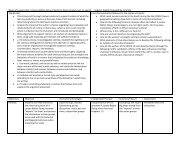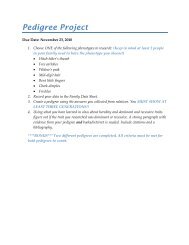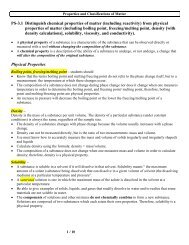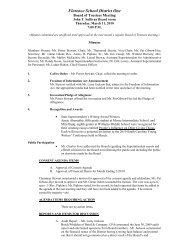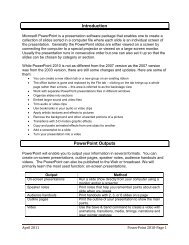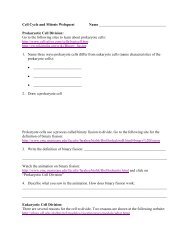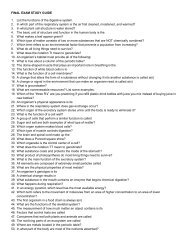Macbeth Study Guide Questions
Macbeth Study Guide Questions
Macbeth Study Guide Questions
- No tags were found...
You also want an ePaper? Increase the reach of your titles
YUMPU automatically turns print PDFs into web optimized ePapers that Google loves.
2. There is a subtle and deeply touching dramatic irony in the content of many of theutterances of Lady <strong>Macbeth</strong> which alludes to actual statements she must have madeearlier to her husband. Keeping in mind her original intention, explain the ultimate ironyin her repeating the following statements during her sleepwalking scene:a. “Fie, my lord, a soldier and afeard? What need we fear who knows it, when nonecan call our power to account?” (V.i.32-34)b. “Wash your hands; put on your nightgown; look not so pale” (V.i.53-54).3. The first scenes of the last act have indicated that the nightmare world created by<strong>Macbeth</strong>’s first evil act is drawing to a close. The striking shifts of mood of <strong>Macbeth</strong>’sspeeches are prompted by the rapid succession of events in the last scenes. Note thealternations of mood as they appear in the following speeches of <strong>Macbeth</strong> and explainthese shifts in the light of the events as they occur.a. The speech beginning, “She should have died hereafter…” (V.v.17-29)b. The speech beginning, “If thou speak’st false…” (V.v.38-52)c. <strong>Macbeth</strong>’s successive remarks to Macduff when they finally encounter oneanother. (V.viii.)4. Despite <strong>Macbeth</strong>’s manifest villainy, many readers at the close of the play retain somemeasure of sympathy for him. How does Shakespeare’s presentation of his thoughts andactions in the last scenes serve to make the reader retain such a measure of sympathy andrespect? Refer specifically to the lines that have this effect.




